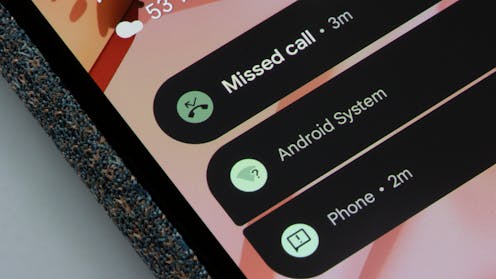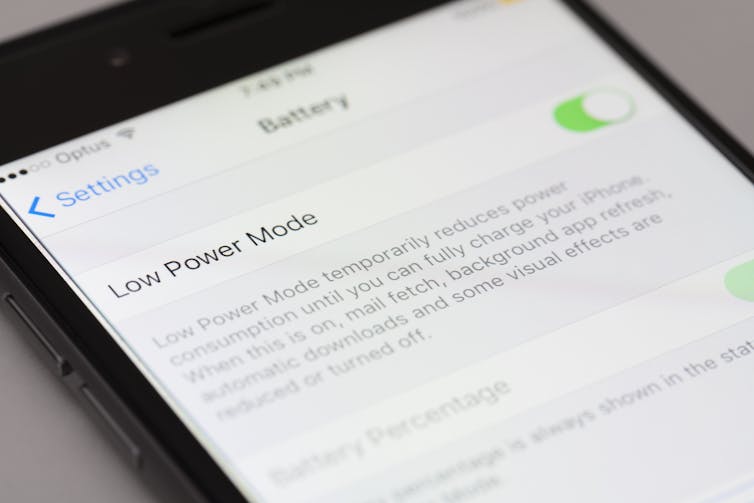Why does my phone sometimes not ring when people call? A communications expert explains


There’s a certain feeling I get in the pit of my stomach when I’m waiting for an important call to come through. You know the type – maybe a call from your boss, a potential new employer or news of a loved one who’s due to give birth.
In these situations, I usually stare at my phone, willing it to ring. I make sure – over and again – it’s not on silent or “do not disturb” mode. When the screen is out of my sight, I imagine I can hear the familiar ringtone.
Then it pops up – the missed call notification. But the phone never rang. What happened?
How do mobile calls work?
When making a mobile call using 4G or 5G networks, the caller dials a number and their network operator (Telstra or OneNZ, for example) routes the request to the recipient’s device.
For this to work, both phones must be registered with an IP Multimedia Subsystem – or IMS – which automatically happens when you turn on your phone. IMS is the system that allows the combination of voice calls, messages and video communications.
Both phones must also be connected to a 4G or 5G cell phone tower. The caller’s network sends an invite to the recipient’s device, which will then start to ring.
This process is usually very fast. But as generations of cellular networks have evolved (remember 3G?), becoming faster and with greater capacity, they have also become more complex, with new potential points of failure.
From phone failures to ‘dead zones’
Mobile phones use Voice over LTE (VoLTE) for 4G networks or Voice over New Radio (VoNR) for 5G. These are technologies that enable voice calls over those two types of networks and they use the above mentioned IMS.
In some countries such as New Zealand, if either of these aren’t enabled or supported on your device (some phones have VoLTE disabled by default), it may attempt to fall back to the 3G network, which was switched off in Australia in 2024 and is currently being phased out in New Zealand.
If this fallback fails or is delayed, the recipient’s phone may not ring or may go straight to voicemail.
Another possibility is that your phone may have failed to register with the IMS network. If this happens – due to something like a software glitch, SIM issue, or network problem – a phone won’t receive the call signal and won’t ring.
Then there are handover issues. Each cell phone tower covers a particular area, and if you are moving, your call will be handed over to the tower that provides the best coverage. Sometimes your phone uses 5G for data but 4G for voice; if the handover between 5G and 4G is slow or fails, the call might not ring. If 5G is used for both data and voice, VoNR is used, which is still not widely supported and may fail.
Mobile apps introduce other potential problems. For example, on Android, aggressive battery-saving features can restrict background processes, including the phone app, preventing it from responding to incoming calls. Third-party apps such as call blockers, antivirus tools, or even messaging apps can also interfere with call notifications.
Finally, if your phone is in an area with poor reception, it may not receive the call signal in time to ring. These so-called “dead zones” are more common than telcos would like to admit. I live at the end of a long driveway in a well-covered suburb of Auckland in New Zealand. But, depending on where I am in the house, I still experience dead zones and often the WiFi-enabled phone apps will more reliably cause the phone to ring.

What can I do to fix it?
If your phone frequently doesn’t ring on 4G or 5G there are a few things you can do:
- make sure VolTE/VoNR is enabled in your network settings
- restart your phone and toggle airplane mode to refresh network registration
- check battery optimisation settings and exclude the phone app you are using
- contact your carrier to confirm VoLTE/VoNR support and provisioning.
But ultimately, sometimes a call will just fail – and there’s very little an everyday person can do about it. Which yes, is annoying. But it also means you have a failsafe, expert-approved excuse for missing a call from your boss.

Informacion mbi burimin dhe përkthimin
Ky artikull është përkthyer automatikisht në shqip duke përdorur teknologjinë e avancuar të inteligjencës artificiale.
Burimi origjinal: theconversation.com